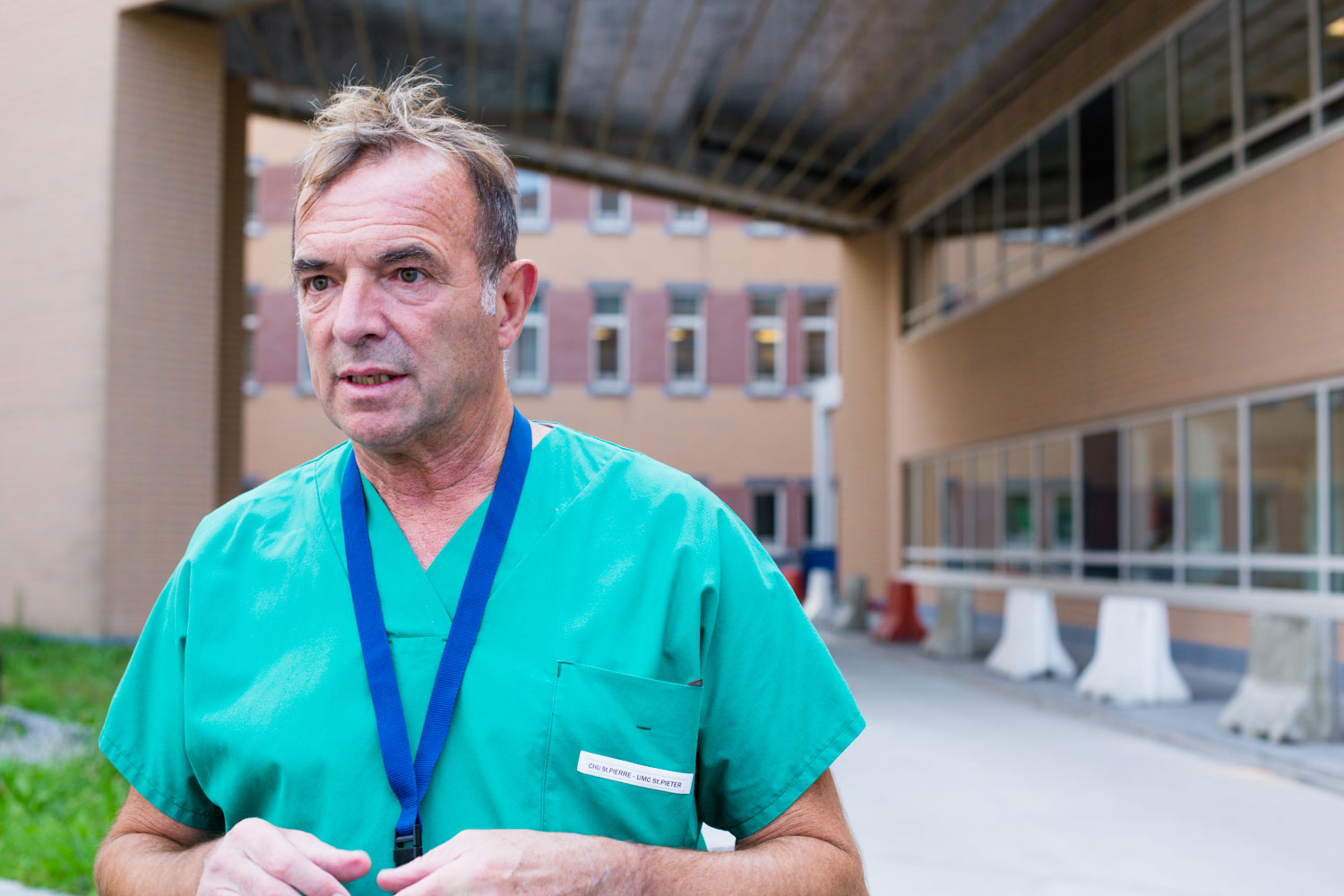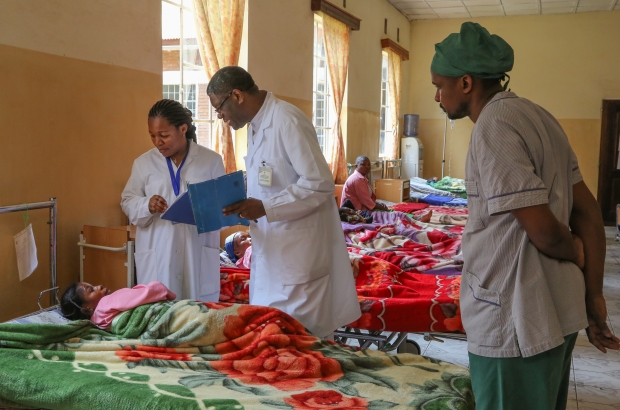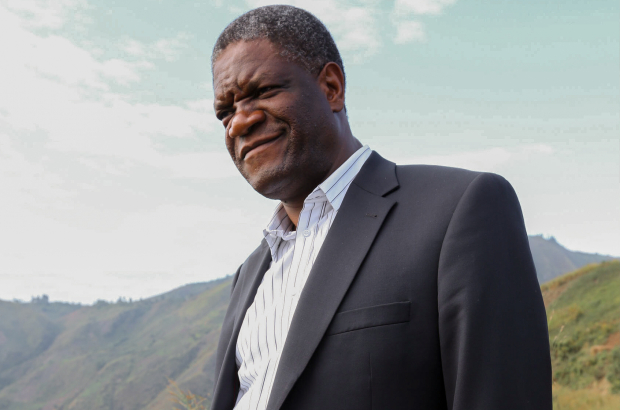- Daily & Weekly newsletters
- Buy & download The Bulletin
- Comment on our articles
Nobel peace prize winner Denis Mukwege determined to continue campaigning against sexual violence
Reflecting on the impact of the Nobel prize, Cadière, head of digestive surgery at Saint-Pierre University Hospital, pinpoints two immediate tasks. The first and more straightforward one on arrival at Panzi, is repairing some of the worst cases of genital mutilation ever inflicted. “These women are doubly incontinent and after repairing their fistulas, they can leave hospital the following day and for the first time since their attack sleep in a dry bed,” he says.
The second is of a more philosophical nature on bringing an end to the violence that has earned the Kivu region the title of rape capital of the world. Says Cadière: “Denis says that he doesn’t want to operate on a woman, then her daughter and then her grand-daughter. He has this vision of making people in the DRC sovereign of their country and future.”
After years of being shortlisted for the world’s leading peace award, Cadière says 63-year-old Mukwege wasn’t expecting it. “He found out when he was in the operating theatre – fortunately the surgery was almost finished – and there was immediately a swarm of people surrounding him,” he says.
“It was crazy, everyone was phoning him and he’s not a communications pro, so there was Hilary Clinton, Michelle Obama, his neighbor, all at the same time,” says Cadière, who succeeded in briefly congratulating Mukwege and his wife via a secure line.

Mukwege’s story has long caught the attention of world leaders as well as feminist campaigners like The Vagina Monologues author Eve Ensler. The humble son of a pastor had trained as a doctor in France before returning to his home region of South Kivu to set up a maternity clinic. In 1999 he operated on a woman who had suffered genital mutilation, and with the rise of similar cases, he founded the free Panzi hospital and foundation. Between 1999 and 2014, Mukwege and his dedicated team cared for more than 40,000 victims of sexual violence, in addition to the thousands of women suffering from gynaecological problems, and the number of interventions continues.
It was his revolt at treating successive generations of women, as well as babies and children, that provoked Mukwege to adopt an activist role. In addition to creating a centre of excellence in the treatment of rape with extreme violence, he implemented a holistic approach to provide long-term help. The Panzi foundation provides psychological guidance, economic support and job training to ensure victims play an active role in determining their future and have a better chance of overcoming stigmatisation.
Furthermore, he highlighted the complex political and economic reasons for conflict in the war-ravaged region around Lake Kivu. Its breathtaking scenery shrouds a horrific battleground generated by the competition – from neighbouring countries as well as local and national interests - to mine the extensive natural resources of gold, silver and coltan, used in electronics. For the past 20 years, armed gangs have terrorised villages, using sex as a weapon of war, to destroy communities and maintain an instable climate.
But Mukwege’s campaigning role on the world stage came at a price. In 2012, an assassination attempt on him and his family resulted in the death of a member of his entourage. He took refuge in Belgium, returning to Bukavu following an outpouring of support by the women of south Kivu. Today, he remains under protection night and day by UN peacekeepers.
In a bid to help highlight his situation, the Belgian film director Thierry Michel and Le Soir’s Africa correspondent Colette Braeckman collaborated on the 2015 film The Man who mends Women: The Wrath of Hippocrates. The harrowing documentary won awards for its uncompromising portrayal of Mukwege’s life work.
Awarding Mukwege the prestigious Nobel prize is seen as a further safeguard to his security. Cadière believes there are contracts on his friend’s head that will now be more difficult to carry out, although there remains a risk from local threats.
Asked about the current level of violent rapes, Cadière replies: “From what I see, there are more rapes committed by civilians, although because of the lack of impunity, those attacked in villages often don’t arrive at the hospital."
“Or a little girl may be raped by her neighbour, because if he is ever stopped, he can give $100 to the prosecutor and it’s over. If that is he’s not the local policeman as everyone uses the power they have, that’s the level of barbarism. There are gangs everywhere and they do what they want, even boasting afterwards. And there are still superstitions that if they rape a baby they won’t get aids.”

The Nobel peace prize was equally awarded to human rights activist Nadia Mourad from Iraq. The 25-year-old was held by the Islamic State for almost three years and has since founded Nadia’s Initiative, which helps women and child victims of genocide, mass atrocities and human trafficking.
For Cadière, the Nobel committee’s decision was long overdue. “That’s why it was also attributed to a woman. For me, it’s the most intelligent Nobel peace prize that could have been awarded. Denis and I have always said that gender violence was one of society’s major challenges.””
Despite their different backgrounds, the two surgeons shared a close personal and professional relationship. Says Cadière, whose son Benjamin is also part of his surgical team: “I’m his confidant; we are like brothers in the African notion of family as I keep an eye on his son here in Belgium and he looks after my daughter there.”
They met in 2011 when Mukwege visited Cadière’s department in search of his pioneering expertise in keyhole surgery. The level of violence inflicted on his patients in the Congo required abdominal repair that would heal faster with minimally-invasive techniques instead of large incisions. The risk of post-operative infection was also significantly reduced with keyhole procedures.
Cadière is proud that Saint-Pierre “is a hospital that treats everyone and was a starting point for the adventure with Denis”. He has a similar sentiment concerning the hospital’s centre (CPVS) for treating victims of sexual violence, which provides medical, legal and psychological support. “Usually, if you report a rape case, you have to go to the police station, give a statement, then go to the hospital and undergo an examination. All you want to do is go home and curl up in the foetal position. That’s why we created the centre in Rue Haute; you recount what happened once to a female police officer in the presence of the gynaecologist,” he says.
During the current mission, Cadière knows the conversation will turn to furthering their combat. “The temptation is strong to use the power of the Nobel to put pressure on the politicians who govern the country. But Denis and are not competent in the political sphere. The question is always how best we can serve; the simplest thing is to continue operating because we do good work.”
Cadière says Mukwege is a visionary who would like to see his home country develop a sustainable economy that exploits its more natural resources such as forests, hydro-electric energy and technology for smartphones. He believes an Africa that became economically attractive would result in fewer migrants in Europe. “It’s a blank page where there are fewer illnesses such as obesity and where a new economy without constraints can be developed,” he adds.
Mukwege will fly to Brussels at the end of November before going to Sweden to receive his prize. Says Cadière: “He had invitations to travel, but he says that’s it’s not because he’s won the Nobel that he will pack his bags. He prefers to stay and continue with his work.”
Saint-Pierre hospital missions to Panzi
Since 2012, Cadière and his surgical team have been flying three or four times ayear to Panzi to help operate on the more severe cases of mutilation. There are now five operating rooms at the hospital, which boasts a total staff of 260.
Each mission costs €25,000 and is supported by sponsors; suppliers of medical equipment, charities and individual donors. “Organising them is always a lot of stress,” underlines Cadière. “If a generator doesn’t work, I can’t use my instruments, and it’s a problem if luggage gets left at Kigali,” he says.
When there are problems, the team has learned to be creative. “For the carbon dioxide (CO2) needed for inflating the abdomen, we go the local brewery with a cylinder and adapter,” says Cadière.
He is training local doctors in laparoscopy techniques who also complete a one-year specialisation at Saint-Pierre. Like Cadière, Mukwege teaches at the Free University of Brussels (ULB). Both surgeons have perfected new procedures and regularly present scientific papers.
For Cadière, the key is that Mukwege and his team request his expertise. “They want to learn and they are motivated to continue, which guarantees perpetuity for Panzi,” he says.
Panzi by Dr Denis Mukwege and Dr Guy-Bernard Cadière is a book about the humanitarian combat that unites the two surgeons
Kivu by Jean Van Hamme and Christophe Simon is a fictionalised comic-strip adaptation of Panzi, published September 2018
Photo: Dr Cadière (c) Natalie Hill














